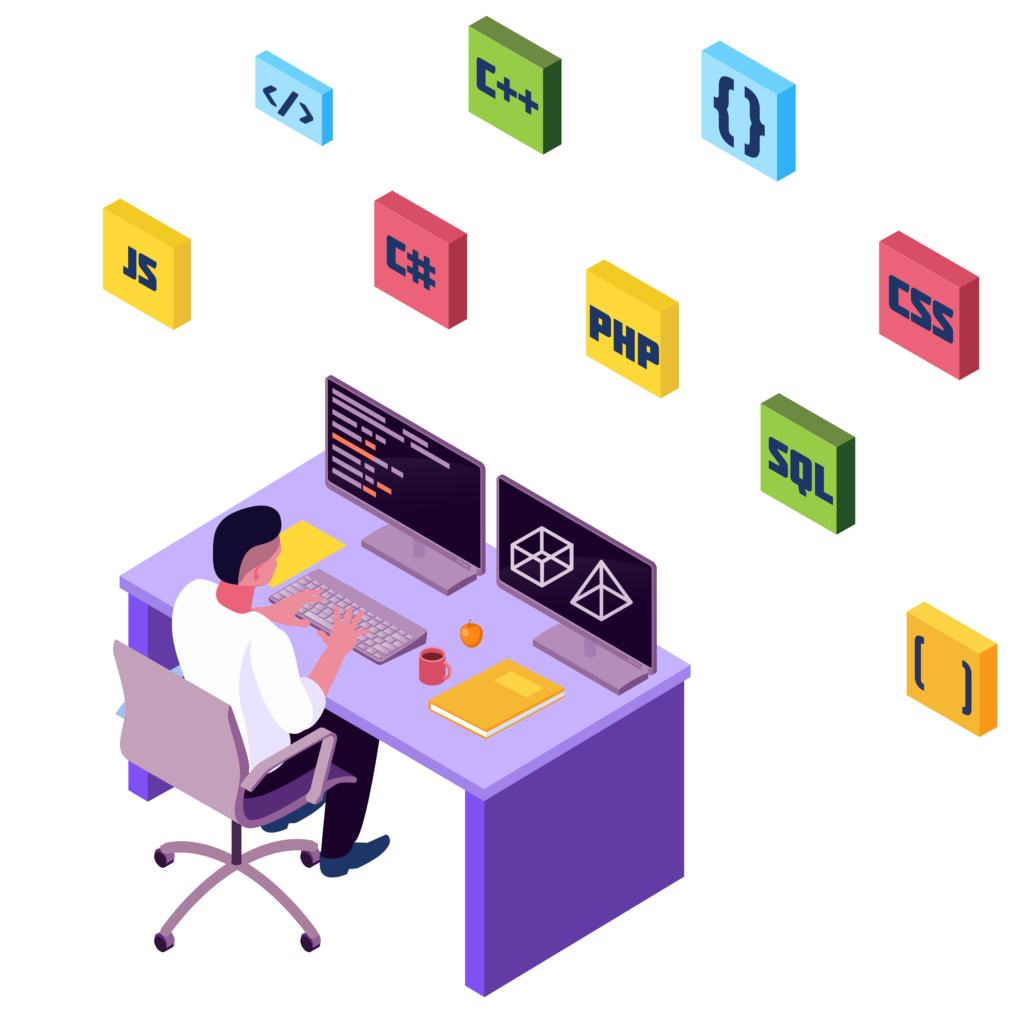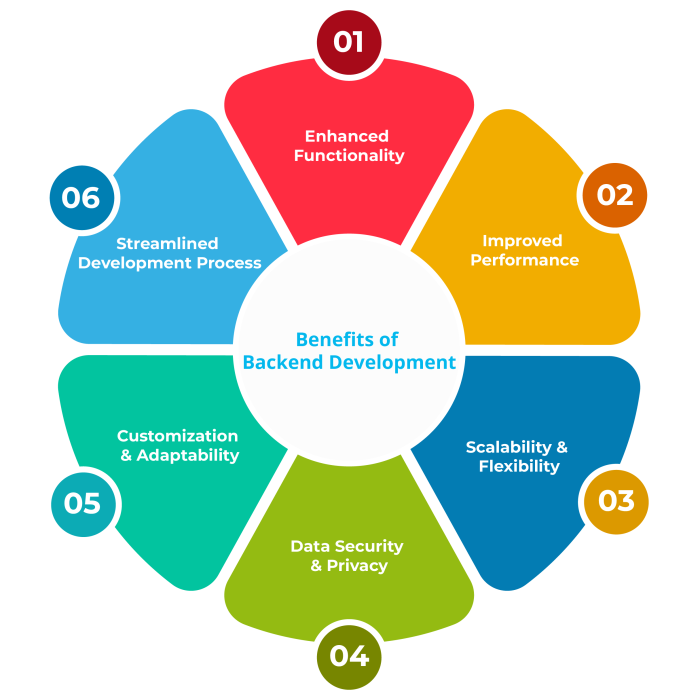Backend Development

Our Backend Development Services
Complere Infosystem provides the opportunities it presents—enhanced decision-making capabilities, improved customer experiences, and the ability to innovate more rapidly—make it a worthwhile endeavor for any data-driven organization.
We have over 200 data experts onboard and over 30 data projects in our portfolio.
API Development
We typically offer API (Application Programming Interface) development services. This involves creating robust and efficient APIs that allow different software systems to communicate with each other. These APIs can be used for integrating third-party services, building mobile apps, or enabling data exchange between different parts of a system.
Database Management
Managing databases is a crucial aspect of backend development. We provide services related to database design, optimization, maintenance, and scaling. We ensure that databases are structured efficiently to handle large amounts of data and transactions while maintaining data integrity and security.
Server-Side Development
Backend developers specialize in server-side programming languages and frameworks such as Node.js, Python (with Django or Flask), Ruby on Rails, and Java (with Spring framework), among others. Developers develop the logic and functionality that powers web applications, handling tasks such as user authentication, data processing, and business logic implementation.
Cloud Services Integration
We offer expertise in integrating cloud services such as AWS (Amazon Web Services), Google Cloud Platform, or Microsoft Azure. We help businesses leverage cloud infrastructure for scalability, reliability, and cost-efficiency. This includes deploying applications to the cloud, managing cloud-based databases, and utilizing cloud-based services like serverless computing.
Security and Performance Optimization
As backend development company prioritize security and performance optimization to ensure that applications are resilient to cyber threats and deliver excellent user experiences. We implement best practices for securing APIs, encrypting sensitive data, and preventing common vulnerabilities such as SQL injection and cross-site scripting (XSS). Additionally, they optimize backend code and infrastructure to improve application performance, scalability, and response times.
Functional Testing
How can you benefit from backend Development?
Seamless Frontend-Backend Integration
- Backend development ensures smooth communication between the user interface (frontend) and the server (backend). By collaborating closely with frontend developers, backend engineers create cohesive user experiences and efficient data flow. This synergy results in responsive applications that meet user expectations.
Full-Stack Versatility
- Backend developers often evolve into full-stack developers, proficient in both frontend and backend technologies. This versatility allows them to work on various aspects of an application, from designing user interfaces to managing databases and APIs. Their ability to bridge the gap between frontend and backend enhances overall project efficiency.
Expertise in Backend Frameworks
- Backend developers specialize in frameworks such as Node.js, Django (Python), or Laravel (PHP). These frameworks provide tools and libraries for building scalable, secure, and maintainable applications. By mastering these frameworks, backend developers enhance their problem-solving skills and contribute to efficient codebases.
Efficient Database Management
- Backend engineers handle data storage, retrieval, and management within databases. They design database schemas, optimize queries, and ensure data consistency. Effective database management is critical for handling large volumes of data and maintaining application performance.

How it Works
01. Server-Side Logic and Data Handling
-
Backend development focuses on the server-side of web applications. It involves creating the logic and functionality that operate behind the scenes. This includes handling data, processing requests, and managing databases.
-
When a user interacts with a web application (such as submitting a form or requesting information), the backend processes these actions. It retrieves data from databases, performs calculations, and prepares responses to be sent back to the client-side (frontend).
03. Programming Languages and Frameworks
- Backend developers choose programming languages and frameworks to build robust applications. Some common choices include: JavaScript (JS) with Node.js:is a popular choice for backend development. Node.js allows developers to run JavaScript on the server-side, which is advantageous because many frontend applications are already built using JavaScript
-
Python with Django is another powerful combination. Python is known for its readability, ease of learning, and versatility. Django, a Python framework, simplifies web development by providing pre-built components.
02. Web Servers and APIs
-
Web servers play a crucial role in backend development. They receive requests from users’ browsers and respond by delivering web pages or data. Examples of popular web servers include Apache and NGINX.
-
Backend developers create APIs (Application Programming Interfaces) that allow communication between different parts of an application. APIs define how data can be accessed and manipulated. For instance, a weather app might have an API to fetch real-time weather data
04. Version Control and Deployment
-
Backend developers use version control systems (like Git) to track changes in code. This ensures collaboration, code management, and easy rollbacks.
-
Deployment involves making the application live. Backend developers configure servers, set up databases, and optimize performance. Cloud providers (such as AWS, Azure, or Google Cloud) play a significant role in deploying applications.
01. Strategy
- Clarification of the stakeholders’ vision and objectives
- Reviewing the environment and existing systems
- Measuring current capability and scalability
- Creating a risk management framework.
02. Discovery phase
- Defining client’s business needs
- Analysis of existing reports and ML models
- Review and documentation of existing data sources, and existing data connectors
- Estimation of the budget for the project and team composition.
- Data quality analysis
- Detailed analysis of metrics
- Logical design of data warehouse
- Logical design of ETL architecture
- Proposing several solutions with different tech stacks
- Building a prototype.
03. Development
- Physical design of databases and schemas
- Integration of data sources
- Development of ETL routines
- Data profiling
- Loading historical data into data warehouse
- Implementing data quality checks
- Data automation tuning
- Achieving DWH stability.
04. Ongoing support
- Fixing issues within the SLA
- Lowering storage and processing costs
- Small enhancement
- Supervision of systems
- Ongoing cost optimization
- Product support and fault elimination.
Why Backend Development is Essential?
Data Management and Processing
- Backend manages the data flow and processing, ensuring the right information is delivered at the right time.
Security and Compliance
- Backend is where security measures are implemented to protect sensitive data and ensure compliance with industry standards.
Scalability and Performance
- A well-built backend allows for easy scaling and ensures optimal performance even during high traffic times.
Seamless Integrations
- Backend facilitates integrations with various third-party services, enhancing functionality and user experience.

Our Backend Development Services

Database Design and Management
Designing efficient databases that optimize data storage, retrieval, and management for your application or website.

Server-side Development
Creating the server architecture and logic that powers your application, ensuring smooth operations and high performance.

API Development
Building robust APIs that enable seamless communication between different parts of your application or between your application and other services.

Content Management Systems (CMS)
Customizing and integrating CMS solutions to streamline content updates and management for your digital platform.
Benefits of Effective Backend Development
Enhanced Data Security
A strong backend ensures data is stored securely and follows best practices for data protection.
Scalability and Flexibility
Well-structured backend systems can easily scale to meet the growing needs of your business and adapt to technological changes.
Improved Performance
Efficiently written backend code results in faster response times and overall improved performance of your application or website.
Cost Efficiency
A well-designed backend reduces operational costs through efficient resource utilization and streamlined processes.



























